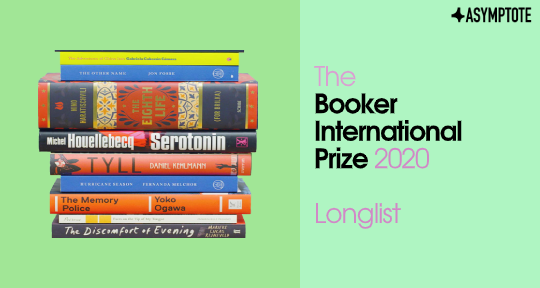Every year, the prestigious Booker International Prize is always announced to a crowd of critics, writers, and readers around the world with much aplomb, resulting in great celebration, some dissatisfaction, and occasional puzzlement. Here at Asymptote, we’re presenting a take by our in-house Booker-specialist Barbara Halla, who tackles the longlist with the expert curiosity and knowledge of a reader with voracious taste, in place of the usual blurbs and bylines, and additionally questioning what the Booker International means. If you too are perusing the longlist in hunt for your next read, let this be your (atypical) guide.
I tend to dread reading the Booker wrap-ups that sprout immediately after the longlist has been announced. The thing is, most critics and bloggers have not read the majority of the list, which means that the articles are at best summaries of pre-existing blurbs or reviews. Plus, this is my third year covering the Booker International, and I was equally apprehensive about finding a new way to spin the following main acts that now compose the usual post-Booker script: 1) the list is very Eurocentric (which says more about the state of the publishing world than the judges’ tastes); 2) someone, usually The Guardian, will mention that the longlist is dominated by female writers, although the split is around seven to six, which reminds me of that untraceable paper arguing that when a particular setting achieves nominal equality, that is often seen as supremacy; and 3) indie presses are killing it, which they absolutely are because since 2016, they have deservedly taken over the Booker, from longlist to winner.
I don’t mean to trivialize the concerns listed above, especially in regards to the list’s Eurocentrism. Truth is, we talk a lot about the unbearable whiteness of the publishing world, but in writings that discuss the Booker, at least, we rarely dig deeper than issues of linguistic homogeneity and the dominance of literatures from certain regions. For instance: yes, three of the four winners of the International have been women, including all four translators, but how many of them have been translators of color? To my understanding, that number is exactly zero. How many translators of color have even been longlisted? The Booker does not publish the list of titles submitted for consideration, but if it did, I am sure we would notice the same predominance of white voices and white translators. I know it is easier said than done, considering how hard it is to sell translated fiction to the public in the first place, but if we actually want to tilt the axis away from the western literary canon, the most important thing we can do is support and highlight the work of translators of color who most likely have a deeper understanding of the literatures that so far continue to elude not just prizes, but the market in its entirety. READ MORE…












